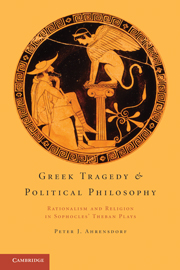Book contents
- Frontmatter
- Contents
- Acknowledgments
- GREEK TRAGEDY AND POLITICAL PHILOSOPHY
- Introduction
- 1 Oedipus the Tyrant and the Limits of Political Rationalism
- 2 Blind Faith and Enlightened Statesmanship in Oedipus at Colonus
- 3 The Pious Heroism of Antigone
- Conclusion: Nietzsche, Plato, and Aristotle on Philosophy and Tragedy
- Bibliography
- Index
3 - The Pious Heroism of Antigone
Published online by Cambridge University Press: 28 June 2009
- Frontmatter
- Contents
- Acknowledgments
- GREEK TRAGEDY AND POLITICAL PHILOSOPHY
- Introduction
- 1 Oedipus the Tyrant and the Limits of Political Rationalism
- 2 Blind Faith and Enlightened Statesmanship in Oedipus at Colonus
- 3 The Pious Heroism of Antigone
- Conclusion: Nietzsche, Plato, and Aristotle on Philosophy and Tragedy
- Bibliography
- Index
Summary
RIGHT OVER MIGHT?
The Antigone presents the always welcome tale of right triumphing over might. A solitary girl defies the edicts of a cruel, tyrannical king in order to bury the corpse of her brother. When arrested, she bravely denounces the king to his face for his injustice and impiety. This denunciation proves to be so powerful that, in time, it is repeated by the king's own son, by a soothsayer, by the king's wife, by the elders of his realm, and eventually by the king himself. At the end of the play, the chorus of Theban elders concludes that King Creon did not see justice until it was too late and failed to recognize that “no one ought to be impious to the gods” (1270, 1349–50; see also 450–70, 692–700, 742–9, 940–3, 998–1032, 1064–90, 1301–21). The seemingly helpless girl finally triumphs completely, for the corpse of her brother is duly buried and the king suffers the devastating loss of his son, a loss foretold by the soothsayer Teiresias as a divine punishment, and one that renders Creon “a living … corpse” (1167). This stunning victory seems due, then, to gods who side with the weak but pious girl and who punish the mighty but impious king. On the surface, the Antigone celebrates piety in all its moral grandeur, for it reassures us that there are gods who ensure the triumph of the righteous, no matter how weak, and who visit destruction on the wicked, no matter how strong.
- Type
- Chapter
- Information
- Greek Tragedy and Political PhilosophyRationalism and Religion in Sophocles' Theban Plays, pp. 85 - 150Publisher: Cambridge University PressPrint publication year: 2009

